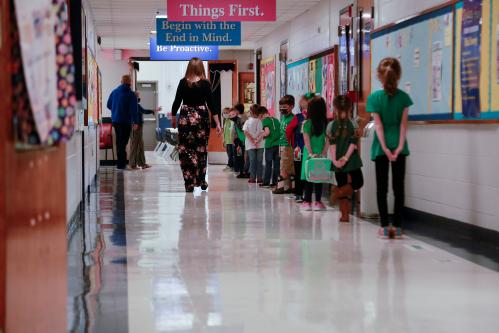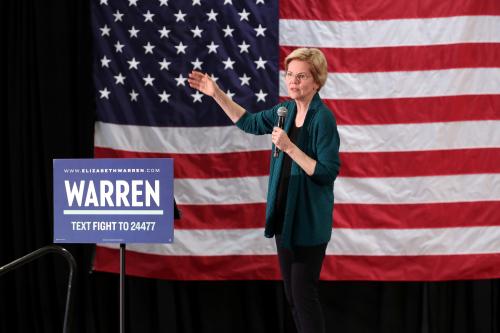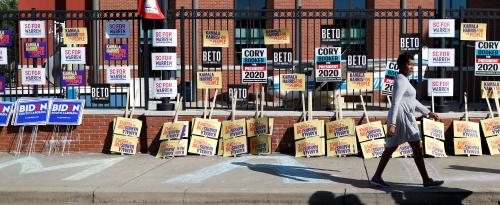Among politicos, education is not usually considered a top-tier issue in presidential elections. The issue tends to get overshadowed by other issues where the president is the obvious leader and decisionmaker—defense, security, climate change, health care, Social Security, and economic affairs. Education, in contrast, has been seen as a state and local issue. But times have changed, especially when it comes to Democratic primaries.
It is worth starting with a brief recap of the recent federal role in K-12 education. President George W. Bush’s No Child Left Behind (NCLB) law in 2001 represented an unprecedented increase in the federal role in K-12 education at the time. President Barack Obama increased the federal role even more—introducing $100 billion in federal education spending (prompted by the financial crisis) and leveraging NCLB to make deals with states that allowed the U.S. Department of Education, through a waiver process, to pressure states to adopt the Obama administration’s preferred accountability-driven policies without getting congressional approval. Indirectly, this gave the federal government a hand in academic standards, which had been previously left to the states, and in teacher evaluation, which few governments, at any level, had ever really tried to touch.
Republicans saw this as executive overreach and Democrats became more disenchanted with the policies themselves, especially their focus on high-stakes testing. This led to the Every Student Succeeds Act (ESSA), which pulled federal law back to something closer to, and a bit less aggressive than, the original NCLB (but still more active than the pre-NCLB era). Many long-term members of Congress even recanted their original support for NCLB and their support for ESSA was meant to send just that message.
Given the NCLB-ESSA story, one might think the federal role would fade as a political issue in presidential elections, but this has not happened. In fact, I argue that education might be more important than ever in the 2020 election and for years to come:
1. Education is becoming more important in daily life
In perception and reality, education is becoming more and more important to parents and the long-term life success of their children. It is also a key cog in the macroeconomy, with over $1 trillion in spending annually (mostly from public sources). These are the underlying forces that led to NCLB and the importance of education has only continued to grow. The sector has simply become too important for politicians at any level to ignore.
2. Early childhood education
Education has increasingly become a pocketbook issue as the share of women in the workforce has increased. Working parents need someone to care for their children, and given what we know about social and cognitive growth in the early years, publicly-funded early childhood education has many potential advantages. Meanwhile, federal policy has been remarkably stagnant, still rooted in LBJ-era policies like Head Start and federal tax credits. The issue is ripe for policy change and offers yet another reason for voters and presidential candidates to pay attention to education. Support for early childhood is very high in polls, with bipartisan appeal.
3. Higher education
The federal government has long played a significant, though quiet, role in funding colleges and universities with Pell Grants, student loans, and regulations. However, as student loan debt has skyrocketed, the federal government is a natural place to look for solutions. While more contentious than early childhood, many of these ideas also poll well across the political spectrum.
4. Tight state budgets
Education—especially any new programs addressing early childhood education and college affordability—requires resources, something in short supply at the state and local levels. Health care and pension benefits are taking on a larger and larger share of state spending. States have also shown a strong inclination to cut higher education first when budgets are tight. The federal government, with its borrowing power, almost has to be involved in any major spending effort.
5. Inequality problems
Inequality is real and fast-rising issue, and one of the key concerns among Democrats. Income inequality is partly caused by unequal educational opportunity (though not as much as some education advocates would have it). Early childhood education is also a factor in gender-based income inequality since child care and early education are central to allowing women—still the primary caregivers—to have equal access to opportunities in the labor market.
6. Political practicality
More so than other issues, because most people interact with public education in some way, education positions can be used to attract support from very specific constituencies. Want to attract younger voters? Promise more money for higher education, like free college and loan forgiveness. Want to attract African-Americans? Support for historically black colleges and universities. Want to attract rural voters? Create a rural education proposal. Want to attract women? Focus on early childhood education. Education is the Swiss army knife of policy and politics.
7. Diploma and Gender Divides
In the early 2000s, voters with more formal education voted fairly equally for Democrats and Republicans. Not anymore—53% of college-educated white voters went for Democrats in 2018 compared with 37% of non-college-educated whites (I could not find the same numbers for people of color or the whole population). It stands to reason that voters with more formal education are especially likely to see education as an important policy issue. Education is also more of a pocketbook issue for women, who also vote disproportionately for Democrats.
8. Betsy DeVos
DeVos is one of the more reviled figures in what is, for Democrats, a highly reviled Trump administration. Her lack of experience in education (especially public schools), early glaring missteps (“guns and bears”?), and strong support for vouchers and online schooling, generally opposed by Democrats, make her an easy target for generic political attacks. (Not that it matters for purposes here, but her ideas also lack research support to recommend them.)
For all of these reasons, education will be a major issue on the minds of Democratic voters. One poll has it among the top five issues for Democratic voters. Only health care beats it (and only slightly). This rising importance may also be long-lasting. The first seven factors above seem like structural changes, unlikely to shift with the political winds. Reinforcing this point, the candidates are coming out with major education policy proposals on an almost daily basis (more to come in later posts).
The rising importance of education as an issue in the party is not the only reason that it will matter more in 2020.
For more on the importance of education in the upcoming election, read this piece that focuses on the state of the Democratic primary and teacher unions.







Commentary
8 reasons why education may be pivotal in the 2020 election (and beyond)
June 3, 2019